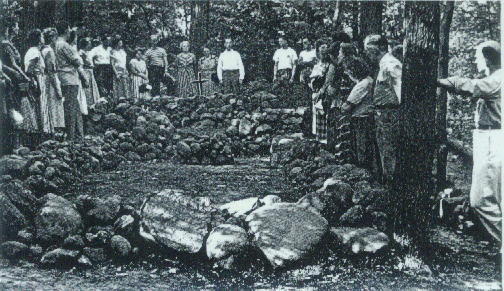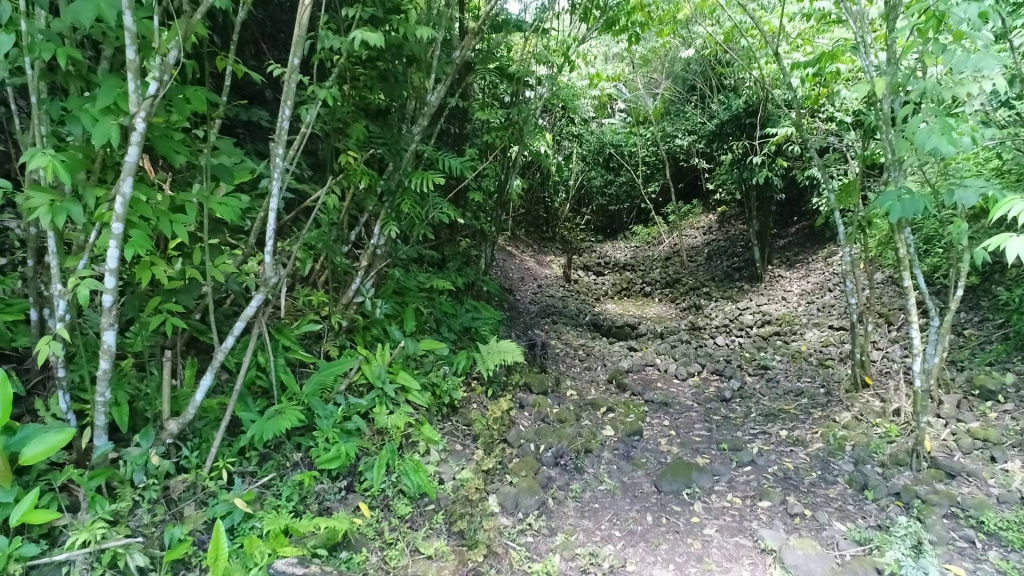Francis Neil G. Jalando-on

American Baptist missionaries and CPBC members visited the “Cathedral in the Glen” after World War II.
In a letter dated May 18, 1943, marked “Strictly Confidential,” addressed to a certain “Dr. Decker and all at the Rooms” of the American Baptist Foreign Missionary Society, Rev. Dr. Francis Howard Rose described their situation in the mountains of Tapaz, Capiz after 13 months.
Dr. Rose, a gifted artist, described the setting of the “Cathedral Glen Community Church”—a label that he himself made. He wrote, “Near our camp there is a beautiful deep dry gorge with giant trees growing in it. Here during the first weeks of our pilgrimage I built seats, altar, pulpit and lectern, all of wild or uncut stones and small rocks and we have conducted worship in this place every Sunday…” Furthermore, he narrated, “Several missionaries take their turns at conducting worship and the doctor’s wife sings solos frequently. A folding organ is provided by the evangelistic missionary from the Doctor’s compound.”
As a pastor, Dr. Rose continued his pastoral ministry in “Hopevale.” He recounted, “One Easter Sunday, I had the joy of baptising a thirteen year old boy, son of one miner couple here, in a beautiful shady pool in a little mountain river that flows by not far from our camp. About a hundred attended this Easter service.” He even visited some nearby churches: “Church work is going on in town and country with remarkable fortitude on the part of pastors and congregations. Last Sunday I preached at a country church about eight miles from the nearest enemy outpost and a half mile from the provincial highway; eighty people present, mostly women and children, however.”
This pathway and lush forest stood witness to the testimony and faith of the Hopevale martyrs.
As the American Baptist missionaries were with fellow evacuees, Dr. Rose praised the generosity of the Filipinos who were with them. He wrote, “They have proven to be very helpful to us and all are of a disposition pleasing to live with even in such trying circumstances. Some of them have lent us money liberally to help us along until we are able to draw our salary again… The national protestant Christians near here have been extremely helpful in getting supplies for us… Some have risked their lives for us, not once nor twice, but some several times.” He described what they were eating: “We have always had plenty of food here; some canned goods, but mostly native things, with plenty of good fruits in season, pork and carabao meat occasionally, as with sweet potatoes and sweet corn.”
The letter signed by Francis and Gertrude Rose ended with these words, “God be praised it so well with us to date. Love to all.”
Seven months after the letter was sent to New York, USA, the 11 American Baptist missionaries, including Dr. Rose and his wife Gertrude, were martyred because of their Christian faith in Hopevale, Tapaz, Capiz.
On December 17-20, 2018, the Convention of Philippine Baptist Churches will spearhead the Hopevale Diamond Commemoration to be held in Central Philippine University, Filamer Christian University and in Hopevale, Tapaz, Capiz. If you will attend, you will surely hear more stories about these American Baptist missionaries and their Filipino counterparts.

